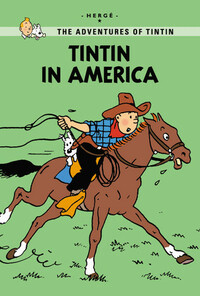Take a photo of a barcode or cover
A disappointing start to the Tintin series. A simplistic series of incidents strung together by unlikely coincidences onto a threadbare plot. Tintin is one-dimensional and uninteresting in this story.
I know that the series gets better as I read some of the later ones to my children when they were younger. Therefore, I will persevere and hope that Hergé hits his stride quickly.
I know that the series gets better as I read some of the later ones to my children when they were younger. Therefore, I will persevere and hope that Hergé hits his stride quickly.
Тінтін прибуває до Америки. Власне, до Чікаґо, що за кількістю ієрархічно організованих злочинців виглядає як прототип Ґотема. Від нелагідного прийому практично до самого відбуття наступні пригоди повторюються з невеликими варіаціями. Злочинці здійснюють підступ. Тінтіна чекає неминуча смерть. Чудесний порятунок. І все спочатку.
This is one of the most racist books I've ever read! I am 100% unclear on how old TinTin is supposed to be.
The part where a buncha (white)moguls think our (white) hero has discovered an oil well and start bidding at 5000 dollars, and make it up to several hundred thousand dollars, before being informed that the well actually belongs to the local Native American tribe, who they then give 25 dollars and chase off the land? That is some brilliant satire on a terrible time.
The part where those same Native Americans are written as bloody bungling idiots who can't even recognize their friends? That part falls flat to the modern reader
I am aware that this was written in the thirties, and it may well have been super progressive for its time, but that doesn't mean it's fun to read in the present.
The part where those same Native Americans are written as bloody bungling idiots who can't even recognize their friends? That part falls flat to the modern reader
I am aware that this was written in the thirties, and it may well have been super progressive for its time, but that doesn't mean it's fun to read in the present.
Absolutely loved that Hergé called out the erasure of Native Americans in this comic. His portrayals of characters of color are still problematic on the whole tbh and I wasn’t expecting him to highlight the lunacy of blind capitalism and racism. An extra star for that.
[Comics Canon Review]
It’s hard not to fall into step with the adventure and action and mystery of Tintin in America, but it’s even harder not to feel that whatever joy I might get from reading this book is colored by its racist underpinnings. The racism of the Tintin comics is not “a minor detail,” “typical for its time,” or an “unfortunate distraction”; rather, racism is, in fact, central to the Tintin comics, so there’s just no getting around or over it.
It’s hard not to fall into step with the adventure and action and mystery of Tintin in America, but it’s even harder not to feel that whatever joy I might get from reading this book is colored by its racist underpinnings. The racism of the Tintin comics is not “a minor detail,” “typical for its time,” or an “unfortunate distraction”; rather, racism is, in fact, central to the Tintin comics, so there’s just no getting around or over it.
I quite enjoyed this book although Hergé is extremely limited in his understanding and representation of America (it's mainly filled with gangsters and Native Americans), however the book does give a critical statement over his opinion regarding lynching and the theft of Native American land to American business and greed for oil.
The text below is included in ALL of my reviews for the Tintin series. If you've already read it, please skip to the last part.
I am a lifelong fan of Tintin and Hergé. Tintin was the earliest memory I have of being exposed to books and stories, my dad started to read Tintin to me when I was less than three years old and continued to do so until I learned to read on my own. I have loved these stories my whole life, and I know all of them by heart, in Persian, in English, and in French.
But, as a devout fan, I think it's time to do the hard but right thing: confess that these books are far from perfect. They are full of stereotypes, racist, whitewashed, colonialist, orientalist, you name it. Not to mention a complete lack of female characters (Bianca Castafiore is a mocking relic of the poor dear Maria Callas that Hergé hated, her maid Irma is present in approximately 20 frames, Alcazar's wife also, anyway, there aren't any significant female characters in these books).
In the past few years, I've struggled to decide how I feel about these books. Will I dismiss them? Consider "the time they were written in" and excuse them? Love them in secret? Start disliking them? I don't know. So far I haven't reached a fixed decision, but I will say this: I am aware that these books are problematic. I acknowledge them. I don't stand for the message of some of these books. At the same time, I won't dismiss or hide my love for them because they were an integral part of my growing up memories and fantasies and games, and I do, still, love captain Haddock very much, stupid and ridiculous as he is.
Tintin in America is distressingly colonialist with an awful depiction of indigenous folks of the Americas. It's one of my least favorites in the series. (I still like it a lot, but a bit grudgingly.)
I am a lifelong fan of Tintin and Hergé. Tintin was the earliest memory I have of being exposed to books and stories, my dad started to read Tintin to me when I was less than three years old and continued to do so until I learned to read on my own. I have loved these stories my whole life, and I know all of them by heart, in Persian, in English, and in French.
But, as a devout fan, I think it's time to do the hard but right thing: confess that these books are far from perfect. They are full of stereotypes, racist, whitewashed, colonialist, orientalist, you name it. Not to mention a complete lack of female characters (Bianca Castafiore is a mocking relic of the poor dear Maria Callas that Hergé hated, her maid Irma is present in approximately 20 frames, Alcazar's wife also, anyway, there aren't any significant female characters in these books).
In the past few years, I've struggled to decide how I feel about these books. Will I dismiss them? Consider "the time they were written in" and excuse them? Love them in secret? Start disliking them? I don't know. So far I haven't reached a fixed decision, but I will say this: I am aware that these books are problematic. I acknowledge them. I don't stand for the message of some of these books. At the same time, I won't dismiss or hide my love for them because they were an integral part of my growing up memories and fantasies and games, and I do, still, love captain Haddock very much, stupid and ridiculous as he is.
Tintin in America is distressingly colonialist with an awful depiction of indigenous folks of the Americas. It's one of my least favorites in the series. (I still like it a lot, but a bit grudgingly.)
Way too many coincidences, too many just-missed-by-hair occurrences and everything works out in Tintin's favor. Pretty much that.





